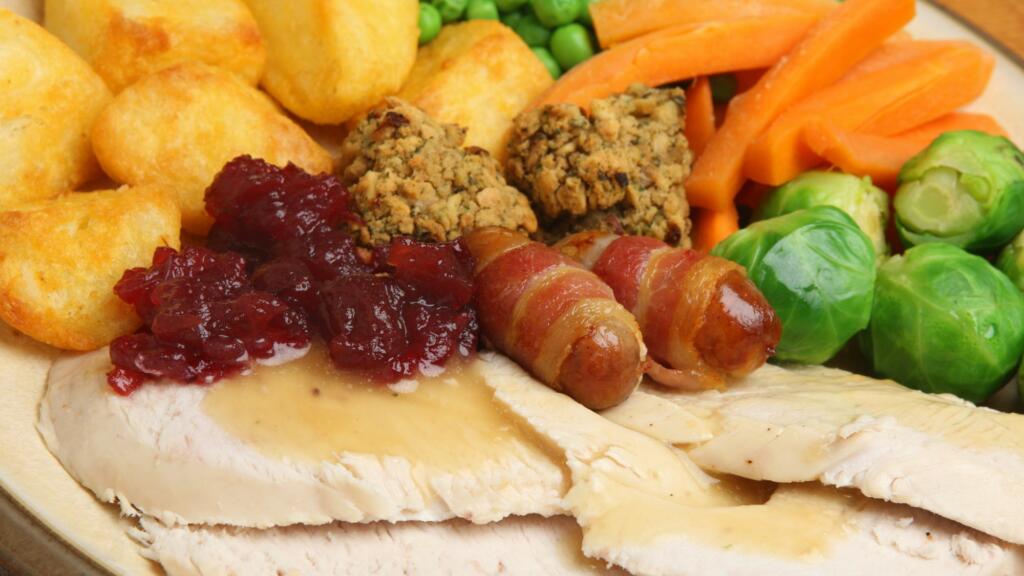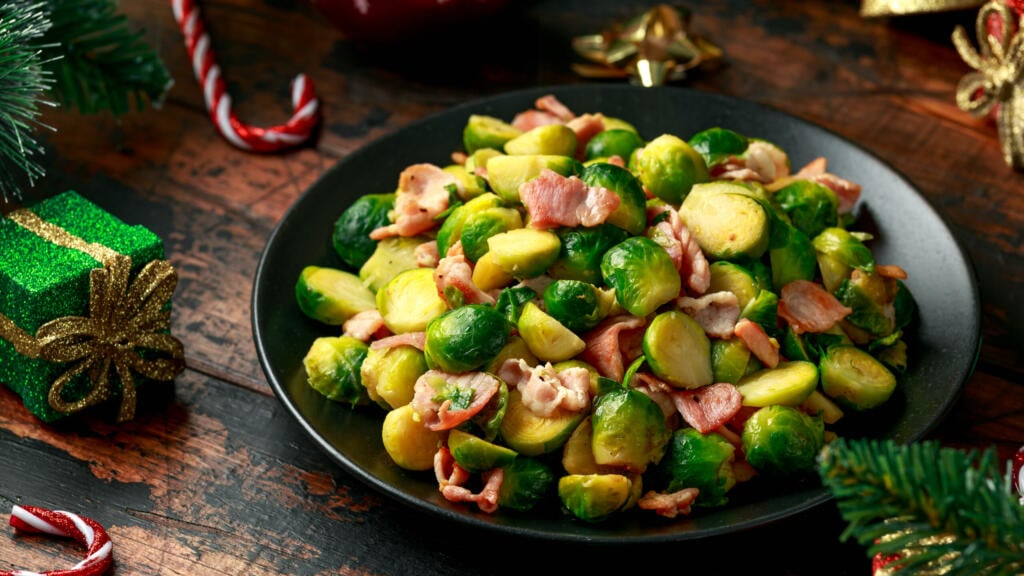
Can you really cook Christmas dinner in an air fryer? We put it to the test…
Jayne Cherrington-Cook
Why we should be eating more Brussels sprouts with celebrity chef recipes to try.
Love them or hate them, no other vegetable divides public opinion like the humble Brussels sprout.
The ball-shaped brassicas have become synonymous with the festive season and us Brits eat more of them than any other country in Europe. The Office for National Statistics says our supermarkets sell an incredible 750 million of them in the run up to Christmas.
For anyone yet to be converted, we’ve got all the facts on why Brussels sprouts are so good for us, how to help prevent their smelly side-effects and there’s some celebrity chef recipes for you to try.
Love them or hate them, no other vegetable divides public opinion like the humble Brussels sprout.
The ball-shaped brassicas have become synonymous with the festive season and us Brits eat more of them than any other country in Europe. The Office for National Statistics says our supermarkets sell an incredible 750 million of them in the run up to Christmas.
For anyone yet to be converted, we’ve got all the facts on why Brussels sprouts are so good for us, how to help prevent their smelly side-effects and there’s some celebrity chef recipes for you to try.
 Credit: Shutterstock / DronG
Credit: Shutterstock / DronGIn the UK we love our sprouts so much that an area the equivalent of 3,240 football pitches is covered by Brussels sprouts fields. We might love these winter veg, but what are they?
Gardening experts, the RHS, says the Brussels sprout is a member of the Gemmifera cultivar group of cabbages (Brassica oleracea). A forerunner to the modern sprout is thought to have been grown in Ancient Rome, but Brussels sprouts as we know them, were first grown in Flanders, in the 13th century. They grow up to 4cm in size and look like miniature cabbages.
Now more than 110 varieties of sprout are available to grow, including green and red varieties.
For such a small vegetable, the Brussels sprout packs a real nutritional punch.
Saga Exceptional spoke to registered nutritional therapist Anna Mapson. She said: “Brussels sprouts are a low-energy food, high in fibre and essential nutrients such as vitamin K. A portion of sprouts (around 80g) counts as one of your five a day.
“This portion will give you around 50% of the vitamin C and vitamin K you need each day. Sprouts are also high in antioxidants such as kaempferol which help protect against inflammatory wear and tear and damage to cells. All in all, they are an important addition to your winter diet.”
Holford says sprouts are a Christmas dinner essential

Nutritionist and founder of Food for the Brain, Patrick Holford adds that sprouts are great for detoxifying our bodies – really important at this time of year when our alcohol intake may be higher than normal.
He said: “Vegetables whose leaves grow as a cross (cruciferous) are all part of a special food family that enhances the liver’s capacity to detoxify, which is not a bad thing given the excesses over the festive season. This includes cabbage, cauliflower, broccoli, Brussels sprouts and kale. This is because they contain something called glucosinolates that help a critical liver detox process called glucoronidation.”
“That’s why I recommend a serving of cruciferous vegetables every day and Brussels sprouts as a Christmas dinner essential.”
Holford says that the health benefits of sprouts is backed up by science.
“Some ingenious scientists managed to extract the glucosinolates from Brussels sprouts and fed volunteers either regular Brussels sprouts, with glucosinolates, or without,” he explains.
“Those fed the glucosinolate-containing Brussels sprouts had 30 per cent more active antioxidant enzyme function, showing just how powerful these glucosinolates are.”
Mapson explains the reason why sprouts can create their undesirable side-effect is due to the fact they are high in fibre and rich in sulphur.
She says: “Any high-fibre food can create flatulence, especially if you are not used to eating a lot of fibre.
“Fermentation occurs as undigested fibre reaches the large intestine where gut bacteria ‘eat’ it. They produce gas as a by-product of this metabolism of the fibre.
“Fibre that the gut bacteria like to eat are sometimes called prebiotics, meaning they promote the growth of beneficial bacteria and reduce unwanted microbes.”
Mapson explained that sprouts are rich in sulphur. It’s one of their health benefits but can also produce an embarrassing reaction in our bodies.
She said: “The sulphur in sprouts can be used to create glutathione, a powerful antioxidant.
“Glutathione helps to protect our cells from damage, and Brassica vegetables may be linked to lower rates of cancers.
“As well as this great benefit, unfortunately sulphur can also create more smelly farts. The microbes which enjoy high sulphur foods create hydrogen sulphur gas, which has a rotten egg smell.”
Sprouts are harvested from late autumn to late winter

Mapson says there are a number of things you can do to reduce the undesirable effect of Brussels sprouts.
As long as sprouts are well cooked, some of the fermentable fibre will be broken down, so softer veg tends to have a head start on the digestion process. This might help you avoid too much gas on Christmas Day, so, well cooked rather than lightly cooked.
Don’t expect to eat little or no fibre all year and then get away with eating a pile of sprouts for Christmas lunch and not have any niffy side-effects. Introduce fibre into your diet year-round and ensure you have something every day – pulses, cruciferous vegetables, high-fibre cereals, all of these are great additions to your diet.
If you are really worried about the effect of sprouts on your digestion try taking a digestive enzyme containing alpha-galactosidase. This will help break down some of the starch in sprouts. Not all digestive enzyme supplements will contain this enzyme, so check ingredients.
Take your time to properly chew your sprouts as this will help the chemical breakdown in the digestive tract.
Try to get out for a walk a few hours after your Christmas dinner to let your digestion settle and encourage any gas to be released.
As we get older, sprouts do actually start to taste better!

Did you know that sprouts actually taste better as we get older? And that it’s all down to your genes whether you love them or loathe them?
Researchers from the University of Warwick have carried out research into the science around sprouts.
Lauren Chappell, of the University’s School of Life Sciences, said: “Sulphur is responsible for the bitter sprout taste. As we age, we lose tastebuds, which can make them more palatable – potentially why adults who hated sprouts as children now embrace them in seasonal dishes.
“Sprouts also contain a chemical, similar to phenylthiocarbamide, which only tastes bitter to people who have a variation of a certain gene. Around 50 per cent of the world’s population has a mutation on this gene. The lucky half don’t taste the bitterness usually associated with sprouts, and therefore like them a whole lot more than everyone else.”
There are lots of tasty recipes for Brussels sprouts

We’ve pulled together recipes by some of the UK’s leading chefs to get sprouts into your daily diet, with everything from sticky sprouts, to sprouts with chestnuts and even a pasta dish with sprouts and cheese. Enjoy!

Written by Phillipa Cherryson she/her
Published: Updated:
Phillipa Cherryson is a senior digital editor for Saga Exceptional. Phillipa has been a journalist for 30 years, writing for local and national newspapers, UK magazines and reporting onscreen for ITV. In her spare time she loves the outdoors and is a trainee mountain leader and Ordnance Survey Champion.

Jayne Cherrington-Cook

Dr Mark Porter

Hannah Verdier

Jayne Cherrington-Cook